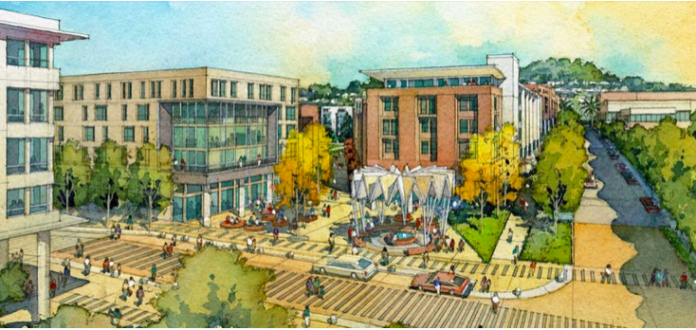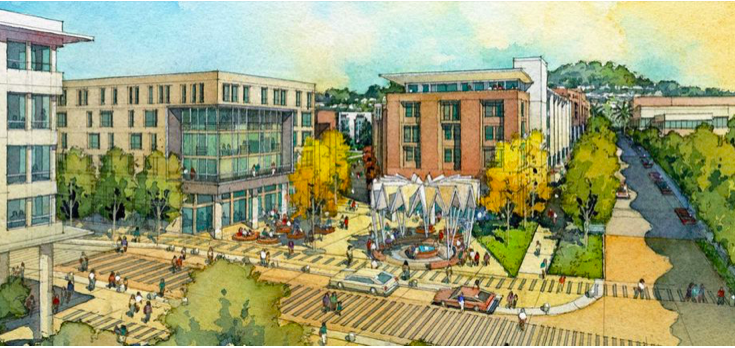
All local news media is critical during this crisis, and most local news media outlets are struggling. But the nonprofits, the outlets that are set up to provide community-supported journalism, are doing some of the best work, and need your help to keep going.
I know this sounds like a pitch to give money to 48hills, and it is – we can only survive with your help. Almost the money we raise goes directly to paying writers and developing stories; we keep our overhead very low.
The good news is that our page views are way up. People are desperate for local news, and we are providing it. None of that is free, of course; we pay our reporters and critics and writers, because we believe that people who do this crucial work should get paid for it.
One of the things we are doing at 48hills is developing what I think can be a new model for local journalism. In the early days of newspapers, publishers depended on sales, subscriptions through the US mail, home delivery, and newsstand sales. For the past 200 years or so, newspapers that served cities and towns and counties and rural communities depended largely on advertising – and that model worked. The Bay Guardian, where I was a reporter and editor for some 30 years, relied entirely on advertising.
But advertisers are no longer putting money into newspapers, so for the first time in the modern history of journalism, we are looking for new ways to provide the news. And the nonprofit, community-supported model is emerging as one of the solutions.
We usually make about half our annual budget at our Spring Gala in May. Obviously, we didn’t do one this year. Hence this message.
If you want to keep us doing what we are doing, anything helps. Most of our contributors give us $100 or less – but if we have 2,000 people giving $100, that goes a long way to keeping us going for another year.
Becoming a monthly donor is huge – it allows us to budget based on predictable income streams.
So help out if you can. Instead of a Spring Gala, we have a GoFundMe, which is here. If you want to become a monthly sustainer, you can sign up here.
Or you can always send a check to SF Progressive Media Center, 176 Winfield St., SF CA 94110.
If you have already given, thanks so, so much – your support means more than I can say. And if you can’t afford anything right now, I understand; 48hills is free, there is no paywall and never will be, and I am happy that you are reading us.
Again: All local media are important. I also want to give a shout out to Rose Aguilar at KALW, who has been doing amazing work. Her station is just finishing up a spring fundraiser; you can donate here.
The Police Commission finally got back to business last week, after the mayor allowed the panel to meet in remote session. And one of its first actions was to approve a sweeping anti-bias policy that has been in the works for more than a year. It includes some of the comprehensive rules in the country, including a “bias by proxy” rule that states:
BIAS BY PROXY. Bias by proxy occurs when individuals call the police and make false or ill-informed claims of misconduct about persons they dislike or are biased against based on explicit racial and identity profiling or implicit bias. When the police act on a request for service rooted in implicit, explicit or unlawful bias, they risk perpetuating the caller’s bias. Members should use their critical decision-making skills drawing upon their training to assess whether there is criminal conduct.
You can read the entire draft general order here.
Why is it a “draft” general order? Because the commission has decided it needs to “meet and confer” with the Police Officers Association, since this could be seen as a change in working conditions.
The POA has used this sort of strategy for years to slow down reforms – and there’s no good reason for the city to allow it.
John Crew, a longtime police-reform lawyer, told me:
SF has long been in the ridiculously bad habit — thanks to DHR and a series of mayors indulging POA unnecessarily — of needlessly meeting and conferring on policy changes that are not mandatory subjects of bargaining under state labor law. Mandatory subjects of bargaining include only wages, benefits and changes in the fundamental day-to-day working conditions of police officers… and, even then, there are exceptions for core “managerial prerogatives” that impact police community relations that need not be bargained. A bias policy worked on for YEARS by a collaborative committee is not a mandatory subject of bargaining.
He added:
And, of course, all this goes on behind closed doors, which ends up frustrating the purposes of the Brown Act. I’ve argued that the commission cannot legally go into closed session to talk with DHR and City Attorney to about voluntary meet and confer on topics that are NOT subjects of mandatory bargaining.
The commission also met with the City Attorney’s Office to discuss “pending litigation,” which often means discussing a settlement deal. Among the cases: Oliver Barcenas v. San Francisco, a suit over a cop shooting a man in the back, as he was running away, after what should have been a simple citation (or not) for an open alcoholic beverage on the streets during a Warrior’s victory celebration. The officer faced no criminal charges– but this will almost certainly cost the city millions of dollars.
Then there’s a case where a police sergeant, according to the lawsuit, went “rogue” and disrupted a normally peaceful skateboarding event near Dolores park, sending a boarder flying over a car and leaving him in a wheelchair for weeks. There were no disciplinary charges filed against the officer, but again, the city is likely to pay out a bunch of money.
The Board of Supes isn’t doing much this week, since it’s Memorial Day, when people used to take off and get out of town as the kick-off to the Whole Summer, and although nobody’s going anywhere, it’s still a federal holiday.
But the Planning Commission meets Thursday/28,and will consider a massive project that has been in the works for many years – a plan to build a lot of housing on land next to City College that’s owned by the city and managed by the Public Utilities Commission.

It’s the old Balboa Reservoir, and it’s got room, according to plans, for more than 1,000 housing units, half of which will be below-market-rate. That’s a high percentage of affordable housing, and would actually help the city make progress on its shortage of housing for people who aren’t rich.
It’s also public land, and a lot of folks, including former Sup. John Avalos when he represented the adjoining district, argued that it ought to be 100 percent affordable housing.
A group called Public Lands for Public Good is opposing the deal, arguing that the project by Avalon Bay and Bridge Housing would lead to gentrification in the area and harm City College, which uses the land now for parking and could, conceivably, use it for expansion at some point in the future. Wynd Kaufmyn, a City College professor who works with the group, told me that the real battle will probably be at the Board of Supes, which will have to approve the development agreement and rezoning necessary to make this project happen.
Sup. Norman Yee, who represents the district, is a supporter of the deal. And typically, the board members defer to the district supe on land-use issues.
But this is huge, involving one of the largest piece of undeveloped, available public land in the city.
And it will be an issue in the fall race for the seat of the termed-out Yee.
Myrna Melgar, a former planning commissioner who is now running for District 7 supe, told me
I think the project still needs work. They don’t have an MOU with City College, and the traffic mitigations and improvements are not tight. The MTA has not been present at the CAC meetings. I am worried about exacerbating the traffic mess that is already there on Ocean between the Muni station/280 onramp and Frida Kahlo way and I don’t think what has been proposed is up to my standards.
However, I am not sympathetic to some of the folks who want to keep 17 acres of parking as parking. I do not support that. I had hoped that it would be 100 percent affordable, as is the Mercy project next to unity plaza. It is now 50 percent affordable with 150 units set aside for CCSF staff, and 22 units are homeownership built by Habitat for Humanity. This is in the bond we just passed, and it is more affordable housing than D7 has ever seen in decades so that is good. It has to be a 100 percent union project, and I wish we were better at leveraging union pension fund investment and negotiating for greater affordability. If I were still on the Planning Commission, hearing what I am hearing from the Sunnyside and Westwood Park neighbors, there are key demands that would need to be met before I would vote for it. The MOU with CCSF, and better traffic mitigations on Plymouth, Ocean and Frida Kahlo among them.
Joel Engardio, another D7 candidate, is more supportive:
I believe affordable housing for middle and low income families is important and the Balboa Reservoir is suited for a reasonable amount of housing. I hope that noise and air quality concerns of construction are minimized by phasing in the housing over a longer period of time.
Vilaska Nguyen, also a leading candidate, told me:
I feel when we have an opportunity to build on public land, that’s the best opportunity to build 100 percent affordable housing. If we can’t do it on public land, where can we do it? The deal needs to reflect the needs of the faculty and students at City College, and those stakeholders really need to be at the table.
He said the current plan “is a good starting point” but needs more work.
This is, of course, also happening at a time when it’s not entirely clear that any major developments will get the financing to move forward any time soon.

